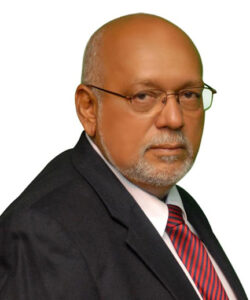Former Guyana president Donald Ramotar on a private visit to Ontario
Says proportional representation system partly to blame for racial problems
By Lincoln DePradine

The system of proportional representation (PR), under which seats are allocated to the National Assembly of Guyana following general elections, is partly to blame for some of the racial issues between Guyanese of African and East Indian descent, according to former President Donald Ramotar.
Current discussions about “electoral reform’’ are just “tinkering with making tough, new laws’’, but won’t solve existing problems associated with proportional representation, which is a British-imposed system on Guyana, Ramotar told The Caribbean Camera.
Ramotar, president from 2011 to 2015, suggested that proportional representation in Guyana should be abolished and replaced with the first-past-the-post constituency system that is used in other English-speaking Caribbean Community countries.
“The PR system encourages people to organize on the basis of small interest groups like race, religion and other things; and in that way, it creates divisions,’’ Ramotar said in an interview Tuesday in Toronto.
“If you look at the experience around the world,’’ he added, “you will see it was the PR system that gave rise to Hitler in Germany, and Germany had to change their system. Italy had to change their PR system too.’’
Ramotar, now on a private Ontario visit, is a 71-year-old former trade unionist, who joined Guyana’s People’s Progressive Party (PPP) in 1967. The PPP was co-founded by former President Dr Cheddi Jagan in January 1950.
“For the first time in my whole life, I am doing what I want to do and not what I have to do,’’ said Ramotar, who served as PPP general secretary from 1997 to 2013.
Ramotar commended Jagan for his strength while he was chief minister, and later premier – from 1961 to 1964 – when Guyana faced hostility from the governments of Britain and the United States.
Jagan and his PPP colleagues “were fighting against the two most powerful imperialist countries in the world’’, said Ramotar.
“Yet, with all of the troubles that they faced, Guyana – socially and economically – achieved a remarkable amount of successes,’’ he said. “It was in that period, we built the University of Guyana and the Bank of Guyana. When Jagan left government in 1964, Guyana had the best balance of payment in the whole Caribbean and the economy was doing extremely well.’’
Jagan, a dental surgeon who served as Guyana’s President from 1992 to his death in 1997, is seen in the Caribbean region as a “great anti-colonial fighter’’, Ramotar said. “But, to my mind, he’s even a greater developmentalist.’’
Ramotar said he now spends time involved in researching and reading, but he hasn’t yet decided on whether to use it as the basis for the publication of a book.
“I’m not such a great writer. But, I would try to, at least, not to allow that research go to waste,’’ he said.
The research and reading are examining “important periods in the history of Guyana; the periods from the 1940s, right on to the 1980s,’’ Ramotar explained.
“I think it’s important because I believe that many of the issues that Guyana still suffers from, many of the things that still hold us back, they have their roots in that period. And, it is important to try to uncover those problems, so that we can be able to deal with them,’’ the former president said.
Guyana’s racial issue “does not really have an objective base but it has been used for so long’’, Ramotar said.
“One of my early conclusions that I have come to, is that part of the problem with the perpetuation of some of the racial feelings and sentiments in the society, has to do with our electoral system,’’ he argued.
“I believe when the British imposed PR on us in 1964, that it was to do two things. The first thing it was to do was to get rid of Jagan out of government. And the second thing was to keep weak governments in the country. That second process didn’t materialize because the PNC (People’s National Congress) rigged elections in a massive way.’’
The constituency system of electoral politics, Ramotar admitted, is not a “silver bullet’’ that would eliminate the race problem. “I’m not saying that. I’m saying that it offers a far better possibility of dealing with the racial problem than the PR system that we have,’’ he said.
“Guyana can very well become balkanized because of the PR system. Already, we saw in the last election, 11 political parties contested the elections.’’


